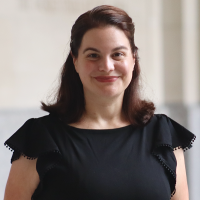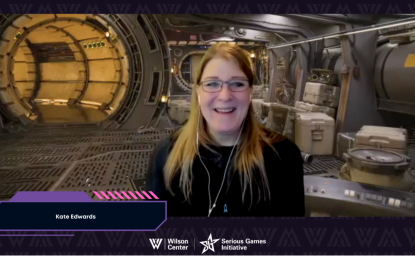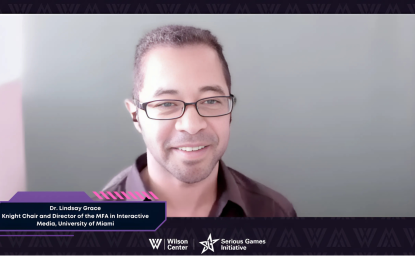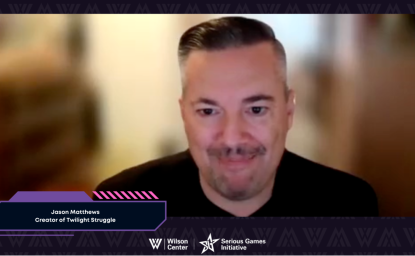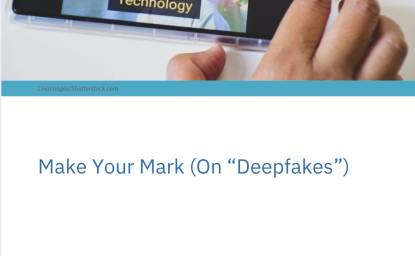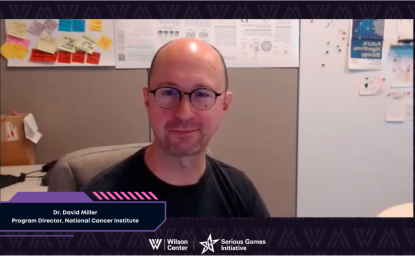Elizabeth Newbury:
Welcome to another video from the Serious Games Initiative. What is the Serious Games Initiative? Well, we're a program from the Wilson Center which focuses on serious games. The objective of our program is to both amplify voices in the field, we also develop games, and we also research games that are being designed for pro social or positive impacts. Our specialty tends to be around policy based research. We are at an international think tank, but we also work with a wide network of experts and leaders in the field to try to see how games can be used for good. So the Serious Games Initiative is celebrating 20 years now in production, and some of the things that we wanted to do in that 20th year anniversary is look back on the field, sort of understand where we're coming from, where we are now, and what the future holds for serious games as a field. So we've collected the best brains in the field to have great conversations on those topics. I'm joined today by Maria Burns Ortiz, who is leading the way when Global Game Jam, and we'll start off with our first question of, could you please introduce yourself and tell us how you orient towards the field of serious games?
Maria Burns Ortiz:
Yeah. So like said, yeah. I'm Maria Burns Ortiz. I am the Executive Director of Global Game Jam, and we put together the world's largest game jam, bringing together developers or aspiring developers, from over 100 countries to almost 800 sites. We had 796 sites last year to create games, and in one weekend, we had folks create 10,000 video games to really look at how we can use games as a way to empower folks, how we can use games as a way to develop skills, how we can create viable pathways for ecosystems in game development as an organization, and so that's what I'm doing. Now, I kind of got here as a game developer myself, and I say a game developer, but I fell into that like so many other folks in game development do, especially serious games, creating a studio where we developed games aimed at closing the math gap, initially for indigenous communities. Then we moved into rural English language learners, and then using games as cultural preservation tools, and all of the things when you start creating games that you see as possible, right? And there's this never ending amount of possibility, which is why I'm so excited about serious games and games as a learning tool, because I really think when you look at Fond memories and education, a lot of what comes out is like, I love playing this game, I love playing that game, and now I get to be a part of that, and that's really incredible. I was thinking the other day, I was like, I'm the first, probably generation of, like, school kids who had games, and I'm talking about the floppy disks that you put into the computer, and I'm Carmen Sandiego was my favorite. I feel like that never gets enough love. But to think that I went from that to now being able to be part of creating that and making it possible that other people create it, it's really cool. And I'm excited about it.
Elizabeth Newbury:
Yeah, for all the younger generations, floppy disk you can probably find in a museum somewhere, but that was how we got a lot of our data onto our computers back in the day, I was also a Carmen Sandiego fan. So you're not alone. So thinking back two decades ago, or back to our childhood, right of playing math blasters, and where in the world is Carmen Sandiego. What would you say with some of the spark or the interest in serious games for you and others of our generation?
Maria Burns Ortiz:
Right. You know, actually, it's interesting. I cofounded my company with my mother, who has PhD in education psychology, has taught from middle school up, and it is something she wanted to do. Creating an educational game is something she wanted to do when she was in graduate school, getting her PhD in the late 80s, and the technology just did not exist at the time. And then fast forward about 20 years later, to a little over a decade ago, and it had advanced, right? And so it was really the perfect time when we looked at, how can we create something that will have an impact in education, especially we're in a lot of schools that didn't have that, that didn't have a lot of access to software, or that had a lot of limited bandwidth, and certainly had a lot of obstacles when it came to accessing curriculum that was reflective of their communities. And so that was kind of the spark for us, is looking at where technology could fill gaps and could make it possible to do things that hadn't been done before. Games seemed like an awesome way to do that, right? And we were also looking at, how do you teach math, and how do you get kids to be resilient and excited about it, and persevere, and all of those things that we talk about needing when we're talking about learning and games encourage all of that. And so that's what I really excites me about it is, you know, you don't expect to get everything right and win a game the very first time you try it. And so when we look to how you can take that, and that's the opposite of the classroom experience for a lot of people, right? It's like, if you fail, that's bad; in a game, if you failed, you would be you know, you expect that, right? And so how we could combine those two, and that was really the spark for us, is how we could find ways to reach students that weren't being reached in a way that was going to get them really excited about learning.
Elizabeth Newbury:
So that sort of tenacity and promoting that grit in learning is one of the motivations. But you also mentioned that your game studio took a lot of native representation, or still takes. Could you explain a little bit more about that?
Maria Burns Ortiz:
Yeah, you know, for us, it was really important that we looked at not just creating, you know, software, but really we started looking at a very specific niche, right? We started with the Spirit Lake reservation in Spirit Lake, North Dakota, and thinking, how could we work to try and improve math outcomes there? And when we started to actually see data, because my co founder is a statistician, right? So it wasn't just enough to create a cool game. It had to do, you know, we had to have impacts. And I think that that's the big thing that, to me, serious games really separates them from everything else. And good serious games, right? Is it's not just something cool, it's not just fun. It's really having a real impact. And we saw that if you had cultural reflective element, it was going to engage students more. And there was a lot of data showing that, but how we could then incorporate that into a game and into a real world. Exercise in using math in a virtual world was really important, and so we started doing that, and we started really when kids see themselves represented, that was such a powerful part, especially when you've never seen yourself represented in the content that you're consuming or the curriculum you're being taught, and to really have that reflective experience. Say, Wait, how did this happen? Who made this? How did this come about? How it shifts a dialog? And we found that often you don't realize how absent you are from your classroom experience, your curriculum experience, until you have that mirror held up to you, and it, it got kids really, really excited. And so we did that, worked with 26 indigenous communities around creating culturally reflective games. And then we also moved into, we did a lot of stuff with rural communities and rural English language learners. Because, you know, the great thing about technology dancing is it's possible to do these things that in the past would cost millions and millions of dollars, and now it's possible to do it at a much more cost effective rate that makes it possible for us to then reach kids where they are, as opposed to this one size fits all. Hopefully, it reflects you, and if not too bad. And so it was really an important part of what we did.
Elizabeth Newbury:
Impact is such a common thread and a lot of concerns around serious games and how you measure it and how you approach it. So it's really fascinating to hear how the impact of representation really does stem into those other learning goals that you're trying to tackle in your games.
Fast forwarding now a little bit to the present day. We're kind of doing a Christmas carol version here of of games. But how do you how far do you think the serious games feel has come even since you started your studio, and now that you're taking the mantle of Global Game Jam?
Maria Burns Ortiz:
Yeah, it's been, you know, it's the way technology is. I've always used to say that, like, what we're using today is not what's going to be what we're using in five or 10 years from now, but it's how we learn those skills and are able to apply them to whatever the next thing is, right? And like I said, we started 7 Generation Games when we did, because the technology hadn't existed before, and then it did, and now we are leaps and bounds above that, right? And we're able to really be looking at taking technology that used to only be accessible if you had high level programming skills, and now making it something that a lot of folks can use, even if they aren't programmers, right? And that's really important. But also then now that, as I've stepped into Global Game Jam, it's not just about teaching folks the platforms or the tools, but it's really about those bigger picture thinking, you know, about a design and one of the things I'm really pushing for is to get people thinking about serious games. Because I think sometimes people look at them as as the secondary thing, like, oh yeah, that's boring, or it's this really good serious games are incredible because they are fun. They get you to want to learn things. They get you to want to engage with that. And so to me, that's really a big focus of mine and through Global Game Jam, what I'm really excited about we get to do is we are part of helping train that next generation. So about over 70% of our GM participants are under 30, about half are 18 to 23 right? And so this is the future of our industry, and being able to make sure that they not only understand how to use the tools and are getting this real world experience, but understanding that they now can make whatever games that they want, and that they can be reflective of them. They can be completely reflective of something else, right, but that we're creating these opportunities that make it possible to tell more and more stories. And I think as we start to hopefully see a shift in not just games for entertainment. I think that's incredible. But how can we take what's really working there and also have an impact? And I think that's really untapped so far. I think, you know, there's a lot of people doing great work, but I think we're at the very beginning of that process, which is what makes me so excited, because it is, like, this huge opportunity, and I think we're starting to just, like I said, just be at the beginning of that. And so I'm really excited to see what's coming next when we look at the future of this industry.
Elizabeth Newbury:
Take it a step back, because I'm realizing some people may not know what a game jam is. Yeah, could you explain a little bit about global game jams approach and how that what sort of impact or what sort of outcomes can you expect from a game jam, through Global Game Jam specifically?
Maria Burns Ortiz:
Yeah, so a game jam is kind of like a hackathon, because we don't know exactly what a hackathon is either. Basically it's a bunch of folks come together and they work on a project to kind of try and create something really quickly. And in our case, a game right? Usually it's a software but our kids, they come together in a game jam, you make a game and it is really important for us. I think ours is not competitive. So there's lots of game jams sometimes they are competitive and you win, and other times they're just something that you learn skills at. Global Game Jam is not competitive, because our goal is, we want it to be about innovation, experimentation and collaboration, right? How do you learn these new skills? How do you work with the team? How do you come up with something that hasn't been created before? And so over the course of ours is, is 48 hours. Teams come together, they are given a theme, and then they make a game around that, right? And this idea of embracing this imperfections, right? That's a really important part to me. Because I think when we're talking about starting out making games, one of my favorite quotes I've heard someone's talking about, you know, they we compare our first drafts to other people's finished products. And when you're trying to get into making games, it's really intimidating, because the games that you're playing are put together, often by companies with millions, maybe billions of dollars, we make it possible for folks to come together as a team, create a game in 48 hours, and then you go on and you build that out, or you try a different game or do that. But for us, yeah, we bring together, like I said, folks from all over the world. We are in, unless mentioned 102 countries last year, 796 sites, and a lot of times it's people who've never made a game before or never worked together before, and just to get that experience of like going through this process of creating a game and then taking something, my favorite part of games is like you take something that existed only in your head, and you turn it into something that people can now play, And then getting them excited to go out and do that better, or revise that, or have learned a new tool, and just strengthen them as game developers and designers, artists, whatever role they have.
Elizabeth Newbury:
It's kind of like plunging quickly into the deep end, but only for 48 hours. Just get that first step of competency and really agency and developing game jam or games.
Maria Burns Ortiz:
Yeah, I think you're and we've got a lot of folks come and it's their first game, or their first product of the town, and the first time is always the hardest, and then you go and you're able to build on that, because that's the great thing about, you know, whether it's always, like, say, games like this metaphor for life too, right? Like you go and you learn, and then you power up, and you get into the next level and, and we're kind of that first level where you run through and and you create the game, and you learn a lot of things that then you can, you know, do better or take with you to the next level.
Elizabeth Newbury:
Do you have tutorials, if it's the first level, do you have like, a ramp up for it?
Maria Burns Ortiz:
You know, we actually, well, we do a lot of onboarding. We have, like, a prep week, and we have a lot of things. And the great thing too is because we're collaborative, you know, we have a lot of folks that come in and really help each other, right? And part of it is like that, learning from someone else that's done it and and sometimes you learn because you fail, and that's how you learn, and that's fine too, but, yeah, we, we try and make it as supportive as possible, because we don't want someone to come and say, Oh this was so hard. And now I realize that I can't make games, right? It's always hard for everyone the first time, it's always hard for people the 10th time, sometimes, right? If you're making a project, you're developing your skills, but that's part of the process. And so to realize that it's about improving, we make we make that possible, hopefully.
Elizabeth Newbury:
That's great. So I love that the there's a common thread between what you're saying, lowering the barrier of access is how I think about it, really making it so that there's a way to get into a concept, either through playing a game or developing a game that you may not otherwise feel like you can engage with. But because of these, the games that you've made and then the game jams that you're putting on, hopefully somebody will feel more encouraged to take that first step in the process.
Maria Burns Ortiz:
I hope so. Because you know, really it is, once you take that first step, you realize, once you make your first game, Oh, it is possible it is. And it's just getting over that sometimes pulling back that fear and saying, like, Okay, I'm worried about this. I've never got it. But, you know, it's a positive and welcoming environment. So you go and you try and and that's, you know, everybody starts somewhere.
Elizabeth Newbury:
Great! I'm going to switch to the last question now, which is future, forward? What do you hope is the future for serious games? Or what do you hope is the next big thing in the field?
Maria Burns Ortiz:
Yeah, well, like I said, I think serious games is just at the very beginning of what it can do, because I think it's starting to as technology advances, right? It makes it possible to do more things. I think people are starting to see the benefits. And not that, you know, sometimes when you live in this serious games world, you're like, of course, everybody sees these benefits, right? But then you sometimes go, and they're like, well, you know, educational games, or serious games, that's this whole other genre. I really think there's the potential as we're able to put those two together to really come up with transformative impacts, right? And I think, to me, the big thing is, is impact. Because anyone in serious games, I always say, if you're not actually working to generate impact through your game, you're not part of the solution. That's part of the problem, right? Is, is to make sure that when you're doing serious games, you are driven to to have some kind of outcome that that hopefully makes the world better, right? Whether it's your player knows a little bit more, or you've shifted mindsets, or whatever that happens to be. So for me, I'm really excited. I really do feel like people are starting to see a stronger value, and we're starting to really also, I think there's more of a push for outcomes and data and really more accountability, which I think has been an issue in some ways in the industry, because anybody could throw out a game and say, oh, this is an educational game. This is a serious game. But now we're starting to see people have expectations, right? Which is good, because if people have expectations, that means they expect something of you, not just, oh, this is a thing. It's not valued. And so I think, like I said, I'm really excited to see where we're, where we see the industry go, both as the technology advances, but then also this understanding of serious games is a really viable, important industry that can transform and reach, you know, communities that maybe haven't been reached by by other solutions.
Elizabeth Newbury:
That's a great observation on how we can transform impact with serious games. I want to point out for the people watching this video that will have links to Global Game Jam, the Serious Games Initiative, all associated with this video down below if we're on YouTube or up above if we're on LinkedIn, but I want to thank you so much, Maria for your time tonight, and just really looking forward to joining you in that future pathway to serious games. So thank you so much. Thanks.

